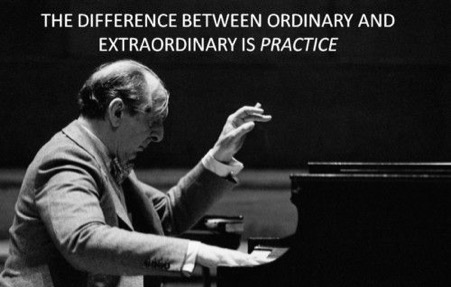What can new managers learn from young musicians?
The difference between ordinary and extraordinary is practice.
Vladimir Horowitz was a 20th century concert pianist who was still performing internationally well into his 80s. He attributes his success to the hours of practice required to perfect his pieces.
Last week students from our local Upper Schools Music department performed a brilliant flash mob in a local department store for their fashion show.

This weekend, my 15 year old son’s jazz band performed at a concert in Windsor to raise money for Windsor Homeless Project Sleep Out 2018.
There are just 2 examples of a whole series of fantastic performances given by members of our Upper Schools bands. I am super-impressed every time I watch them perform their amazing repertoire of music with wonderful enthusiasm and passion.
The audiences clap and cheer but what they don’t see are the hours of practice leading up to each performance.
Before school, during breaks, lunch and after school too, the teenage musicians meet for rehearsals; every evening, my house is filled with the dulcet tones of my son’s trombone practice. Endless scales and repetitions of tricky bars.
What's this got to do with leadership development?
In a brilliant TED talk from Nov 2016,: “How to get better at the things you care about” Eduardo Briceño analyses why he was failing to improve at a wide variety of tasks and skills, despite spending a lot of time doing them, and caring a lot about them. His conclusion draws a crucial distinction between the times when we are learning, and the times when we are performing. We don’t automatically improve by just by performing a task many times. We improve by practising, which is different. Experience does not guarantee expertise.
Few people would challenge the need for musicians, and athletes too, to practice hard to develop their skills and abilities, but in my 20 years as a leadership trainer, I have seen many examples of team members who have been promoted to their first leadership position, and then been expected to transform into a leader almost overnight, without training, coaching or opportunities to practice their newly required skillset. I heard recently about a star sales person who was promoted to manage his own sales team, due to his excellent sales results. He was offered few opportunities for ‘learning’, no leadership development support, but was expected instantly ‘perform’ as a new leader. Within a year, he had been sacked for poor performance. He learned too quickly that the skills and experience that helped him achieve this managerial position were very different to the ones that would have enabled him to keep it.
So, what can new managers learn from these young musicians who so impress me?
1. Practice makes perfect:
Or at least practice makes better. Break down complex tasks and practice the key elements. Create low risk opportunities to regularly rehearse your newly developing leadership skills.

2. A good teacher makes all the difference
Get yourself a coach, sponsor or mentor, or all three, and book yourself some training. Create an ongoing support group with fellow delegates and share challenges, ideas and successes. Some musicians are self taught, but the vast majority learn their skills from a good teacher.
3. Listen to feedback.
If we switch from “transmit” mode, into receive mode – ie stop talking and start listening, we realise that feedback is all around us, we just don’t notice most of it. In a band or choir, every wrong note impacts the performance of the whole ensemble. So musicians receive instant feedback, and develop a clear understanding how their contribution affects the overall performance of the group.
At work, sometimes feedback is contained in a silence or a look from a colleague, manager, or direct report. In order to accelerate your development, try to be open and not defensive, ask for feedback on your performance and listen carefully to the responses. One tip is to make sure you base your questions around the benefits to your team, asking “What else can I do to support you?” or “What I can do to help the team perform better?” Because the focus is on supporting them, these questions are far more likely to stimulate a constructive discussion, than if you ask “How am I doing?” which is all about you.
In summary
So, as a new manager, identify the key skills you need to develop, and create regular, low-key, quiet opportunities to practice them. It’s a lot quieter than trombone practice, anyway!

Our new ILM Level 3 Award in Leadership & Management
If you would like to invest in ILM approved leadership training for yourself, or your team, we are launching our Step Change to Leadership programme on 26th April, in Windsor.
This introduction to leadership programme comprises 3 one day workshops, run monthly, and provides an opportunity to gain the well respected ILM Level 3 Award and Certificate in Leadership & Management, (read more here.)
The 3 days of ILM approved training will help you explore and develop a range of leadership styles, creating a fantastic step change in your knowledge, skills and understanding of Leadership.
You also have the option of completing individual written assignments which lead to the respected Level 3 City & Guilds qualification.
This Award in Leadership & Management is one of the most popular and widely recognised ILM Level 3 courses.

Book your place here
As with all our training, we can come to you and deliver a bespoke programme for your organisation, or you can join our public ILM Level 3 Award in Leadership & Management programmes in Windsor and benefit from learning from other organisations.
Please contact us to see how we can help you invest in your new managers, helping you attract, develop and retain your talent.



A great piece Rosie – and couldn’t agree more, particularly about the importance of a good teacher who can make all the difference to a young person – and James Manwaring is one of the best examples as can be seen by those music performance videos.
Hans Asperger, who gave his name to this form of autism, also recognised the power of knowledge and personality when he wrote about those who teach children with autism: “However difficult they are, even under optimal conditions, they can be guided and taught, but only by those who give them understanding and genuine affection, people who show kindness and yes, humour….mere teaching efficiency is not enough.” Hans Asperger 1944.
Thank you Dawn. I love your reference to Hans Asperger. So true and so important!